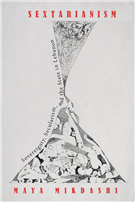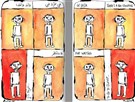This week a pro-Syrian protest was staged at the Syrian Embassy in Beirut. A group of about fifty people gathered to express their solidarity with the Syrian people against the atrocities currently being committed by the Asad regime. As reported in Jadaliyya and elsewhere, this pro-Syrian protest was met violently by pro-Asad counter-demonstrators. Many of the pro-Syrian protestors sustained injuries, some of which were serious enough to require trips to the emergency rooms of nearby hospitals. Since the incident on Tuesday night, a sometimes vitriolic online debate has unfolded between pro-Syrian and pro-Asad activists in Lebanon. Many of these activists, ironically enough, have worked together for years on causes that they both supported. Thus people who worked together in the wake of the 2006 Israel-Lebanon war, the Lebanese Army storming of the Nahr al-Bared Palestinian refugee camp, and the ongoing blockade of Gaza are now finding themselves on opposing sides of what is happening next door, in Syria. Once-comrades have taken to calling each other “Zionists” or “animals” and have tried to stigmatize the other as “March 8” or “March 14,” when in the past they may have together struggled against attempts to cynically and simplistically categorize all political action and thought in Lebanon within this false binary. Missing in these accusations is an attention to the complex ways in which we, as political beings, are often mobilized within larger networks of power in order to service political and economic ends that we may, as individuals, disagree with.
One of the activists who were injured on Tuesday night is a well-known radical leftist who has spent years speaking from the small and shrinking space between the Mustaqbal-led March 14 movement and the Hezbollah-led March 8 movement. These political “factions,” while being political rivals, are allied in that they both represent Power and elite interest in Lebanon. They are similar in their ability to mobilize and immobilize the country, as well as in the fact that they are locked in a necrophilic relationship with the state and its institutions. To put it simply, the weaker the state is, the stronger both March 14 and March 8 are. The less able the state is to provide a modicum of social services and protection to its citizens, the stronger the networks of patronage, clientalism, and corruption carefully maintained by political parties across the political spectrum in Lebanon. In fact, the relationship cuts both ways, the stronger non-state institutions and patronage networks grow, the weaker the state. This happens particularly when state institutions are treated like political footballs that are passed between two irresponsible, corrupt, unaccountable and ineffectual political movements that immobilize the state if, and when, it is not “theirs.”
But power does not always move publicly. It is not always spoken from a podium, or during a parliamentary speech, or during cabinet meetings. Power sometimes operates in more silent ways, moving through our political bodies and (re)positioning us within its undulating current. We cannot always control our alignment within a polarized political field, especially when the political “choice” of the individual is at odds with the political reality of infrastructural, and structural, power. More importantly, there is, and always has been, a constitutive and adversarial relationship between an individual political body and a power structure that is composed of different elements: individuals; institutions; structural relations that tie individuals to other individuals and to institutions; and a discourse that mobilizes and gives their actions force and intelligibility. It is within this adversarial framework that we should question why there is a rush in Lebanon to package every statement, every action, and every motivation into either the March 14 or March 8 “camps,” as if these political movements were hermetically sealed. We know, from personal experience, that life is not always so clear cut. I can be pro-Hezbollah’s resistance to Israel, against the murderous regime in Syria, against Hezbollah’s economic policies and with their social policies. Similarly, I can be for March 14’s social policies, with their economic policies, against their foreign policy, and be supportive of the Asad regime. I can also be a mixture of these two assemblages and/or a political atheist. Thus I can be against Hezbollah but with the SSNP and the Baathist regime in Syria, or I can be a member of the Lebanese Forces who is supportive of that same regime because of a fear of what might happen to Syria’s Christians post-revolution.People are not so easily packaged and bow-tied into boxes that make the same sense, all of the time. But the stakes are so high today in Lebanon that there is no space for an alternative politics to emerge. Rather, there is no structural framework for such a politics to flourish. What happened during and after the pro-Syrian demonstration is a case in point. At this protest, some SSNP members fought against some other SSNP members and their allies because they refused the idea that pro-Syrian protestors “deserve” to be violently beaten by Asad supporters. But afterwards, these same members began to insinuate that everyone who had been at the pro-Syrian protest was an ally, whether closeted or not, of the March 14 movement. Also at this protest, a well-known radical leftist and fierce proponent of an alternative politics had his hip broken for having the audacity to stand with the Syrian people with as much courage as he had stood with the Egyptian, Palestinian, Tunisian, Sudanese, and Bahraini people against the different violence wrought upon them. But after the protest, the activist in question, Ghassan Makarem, was captured unwillingly into a political framework that is weakened by any expression of opinion that does not easily fit into either of the March 14 or March 8 “camps”.
Immediately following the protest on Tuesday night, the Mustaqbal Movement in particular and the March 14 alliance in general, began to call the pro-Syrian activists offering political and economic “cover” for those that were hurt. Ghassan Makarem was taken by the Lebanese Red Cross to the Maqasid Hospital to be treated for his wounds. That first night in the hospital, he was visited by representatives of the Hariri Foundation, which has become the social services arm of the Mustaqbal party, and that were offering to pay for all of his medical care. Of course, they arrived with a Future Channel television crew. Ghassan, who like many of us is allergic to the racist, xenophobic, patriarchal, hyper capitalist, socially conservative, and corrupt politics of the Hariri-led Mustaqbal political party, refused their help and refused to be filmed and branded as a yet another March 14 “martyr.” In doing so, he was rejecting the transformation of his injuries into a symbol of the barbarity of “March 8” and the the-oh -so “civilized” and “democratic” nature of the political parties that oppose them.[1] Either threatened by or unaccepting of his refusal to be coopted into this facile discourse, representatives of the Mustaqbal Movement continued to harass Ghassan and his family with pledges to take care of his hospital bill. Had Ghassan been wealthy, or insured, or “claimed” by a political party, Mustaqbal might have relented. Instead, because they knew that Ghassan is not wealthy, is not insured, and is someone who has spent decades refusing the (different) networks of patronage that are accessible to (different) Lebanese citizens, they knew they had the leverage of resources over him. And here is the ugly reality of politics in Lebanon: a large population needs established (and mostly sectarian) political parties because they, and not the state, have the resources and the political desire to take care of hospital bills, to provide educational and job opportunities, and to provide a network of social services to “their people.” Insidiously, these same political parties control the state and are implicated in its inability to do its job vis-a-vis its citizens.
After Ghassan and his family had been assured that the Ministry of Health would cover his operation, they gathered all the necessary paperwork needed to access this medical service that is the right of every Lebanese citizen who does not have health insurance. While they were still in this process, they discovered that the Hariri Foundation had paid Ghassan’s hospital bill, without their knowledge or consent and without the hospital having the decency to inform them. Infuriated by his being circumvented by a network of resources and authority more powerful than him, Ghassan and his lawyers released an official statement explaining how his hospital bill had turned into a political battlefield between March 8, March 14, and the narrow and precarious space between these two camps that Ghassan had been trying to occupy. The bill had been paid against his will and without his knowledge in an attempt to mobilize his broken hip in the service of a discursive war that continues to leave the country paralyzed. The screws in his bones would not be reminders of a struggle to support Syria against the Asad regime, but rather would be scars of a battle fought against forces large and powerful enough to mobilize material, discursive, and political resources that make Ghassan’s consent irrelevant. In his statement, Ghassan writes that as he was trying to access the state, those same political parties that are locked in a necrophilic embrace with the state had ensured that once again, the space between the March 8 and March 14 camps would be closed. In his statement, Ghassan again makes clear that neither he nor the pro-Syrian protest he attended and was assaulted in supports March 14 or March 8, and that, if anything, he is always against the unjust manifestation of power no matter who wields it. The battle over the hospital bill appears to have been lost, but the war over the Lebanese state’s ability and duty to do its job, over a citizen’s right (no matter what his or her politics) to peacefully demonstrate without being physically violated, over what it means to be in solidarity with Syria when the Syrian regime is killing the Syrian people, continues. The war over if, how, and when we can refuse - and (importantly) who the “we” is that can afford this refusal in a broken and broke third world country - to be packaged and sold in a market place that straddles the poisonous and corrosive March 14-March 8 fault line, continues.
[1] Indeed, one need only study the history of the Lebanese forces to see how “democratic” and “peace loving” the factions that make up March 14 are.
![[Pro-Syria Protestor; Image From Al-Manshour.org]](https://kms.jadaliyya.com/Images/357x383xo/syria2.JPG)





